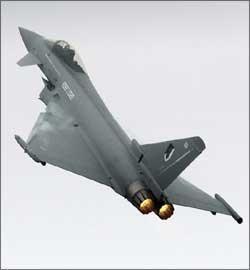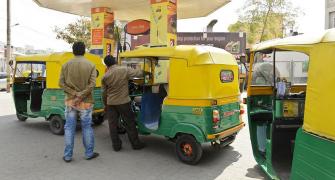 With the four-nation Eurofighter consortium facing the uncomfortable reality of dwindling orders at home, India's tender for 126 medium fighters, worth some $11 billion, is now crucial. So, Eurofighter has reworked some of its most fundamental tenets and structures, to appear more appealing to India.
With the four-nation Eurofighter consortium facing the uncomfortable reality of dwindling orders at home, India's tender for 126 medium fighters, worth some $11 billion, is now crucial. So, Eurofighter has reworked some of its most fundamental tenets and structures, to appear more appealing to India.
Next Friday, Eurofighter boss Bernhard Gerwert will fly into Delhi to offer a new sweetener to the ministry of defence: if India chooses the Eurofighter, it can become a full-fledged manufacturing partner, the first "outsider" to crack a tightly-interwoven four-country manufacturing chain.
The consortium that developed the Eurofighter - comprising the UK, Germany, Italy and Spain - had decided on a unique manufacturing structure. Each part of the Eurofighter is manufactured in a different country; e.g. the right wing is made in Spain, the left wing in Italy. After that, all four partners assemble their own aircraft, bringing the parts together from the plants where they are manufactured.
This EU-style compromise distributed manufacturing jobs (100,000 jobs in 400 companies) amongst the four partners, while creating a mutual dependency.
If India becomes the fifth Eurofighter partner, it will manufacture complete assemblies - say, as a random example, the front fuselage and tail fins - for every new Eurofighter across the world.
That will include fighters for the air forces of the UK, Germany, Spain, Italy, Austria and Saudi Arabia. In addition, Switzerland, Japan, Romania, Greece and Turkey, which are currently evaluating the Eurofighter, could also be on that list.
Kicking off its India campaign in early 2008, Eurofighter had suggested that India could play a major role in the programme, even using the word, "partnership". But that was never elaborated; only now will India unambiguously be offered a share of the manufacture. All four European partners have agreed to forgo a part of their work share to bring India in.
An order like India's is badly needed. Earlier this year, a budget-strapped British Ministry of Defence tried to pull out of buying its contracted share of 88 fighters from the latest batch (called Tranche 3). Eventually the UK honoured its commitments only because default would have cost London billions of Euros in penalties. The other Eurofighter partners are equally cash-strapped; all have jointly agreed to cut back on their orders for now.
In contrast to the gloom in Europe, the future in India looks rosy. EADS - Eurofighter's major shareholder - has enjoyed notable success in penetrating the Indian market. Early this year, EADS signed a $20 million contract to help resolve persistent niggles in India's Light Combat Aircraft programme.
US companies Boeing and Lockheed Martin were ruled out of that bid by Washington's unwillingness to grant permissions (called Technical Assistance Agreements). EADS points to the LCA consultancy as a major victory that highlighted the comparative ease of doing high-tech business with Europe.
Buoyed by the LCA consultancy, EADS is now focusing on the $600 million tender - floated by the MoD on 17 July - for supplying 99 fighter engines for India's single-engine LCA. Eurojet, an EADS subsidiary, has offered EJ200 engines, which power the twin-engine Eurofighter.
The rival engine is the General Electric GE-414, which powers Eurofighter's big rival, the twin-engine Boeing F/A-18. Getting the engine selected, both rivals believe, is a sure path towards getting the fighter selected as well.








